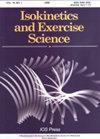Self-rated flexibility significantly reflects the hip flexibility, but not the ankle flexibility
IF 0.7
4区 医学
Q4 ENGINEERING, BIOMEDICAL
引用次数: 0
Abstract
BACKGROUND: Many studies have reported that exercise increases physical flexibility; however, no study has verified whether patients perceive an increase in physical flexibility after exercise. OBJECTIVE: This study investigates the correlations between increased duration of exercise and the self-rated flexibility (SRF) and those between the SRF and quantitative flexibility. Variations in the SRF between males and females were also investigated. METHODS: The SRF of the hip (S-Hip) and ankle (S-Ankle) were rated by participants who completed a questionnaire. The range of motion of the hip (M-Hip) and ankle (M-Ankle) were measured using the straight leg raise test and dorsiflexion, respectively. RESULTS: No significant correlation between exercise duration and S-Hip and S-Ankle were identified. S-Hip and S-Ankle (p< 0.001) and S-Hip and M-Hip (p< 0.001) were significantly correlated, though S-Ankle and M-Ankle were not (p= 0.660). The exercise duration, S-Hip, and S-Ankle were not significantly different between males and females. CONCLUSIONS: Given the significant correlation between hip flexibility and SRF and no gender effect, SRF may serve as a useful clinical indicator.自我评定的柔韧性能明显反映髋关节的柔韧性,但不能反映踝关节的柔韧性
背景:许多研究报告称,运动可增加身体柔韧性;但是,还没有研究证实患者在运动后是否感觉到身体柔韧性的增加。目的:本研究调查了运动时间的延长与自评柔韧性(SRF)之间的相关性,以及 SRF 与定量柔韧性之间的相关性。此外,还调查了男性和女性之间 SRF 的差异。方法:参与者填写问卷,对髋关节(S-Hip)和踝关节(S-Ankle)的 SRF 进行评分。髋关节(M-Hip)和踝关节(M-Ankle)的活动范围分别通过直腿抬高测试和背伸进行测量。结果:运动持续时间与 S-Hip 和 S-Ankle 之间无明显相关性。S-Hip 和 S-Ankle (p< 0.001) 以及 S-Hip 和 M-Hip (p< 0.001) 显著相关,但 S-Ankle 和 M-Ankle 不相关 (p=0.660)。男性和女性的运动持续时间、S-髋关节和 S-踝关节没有明显差异。结论:鉴于髋关节柔韧性与 SRF 之间存在明显相关性,且无性别影响,SRF 可作为一项有用的临床指标。
本文章由计算机程序翻译,如有差异,请以英文原文为准。
求助全文
约1分钟内获得全文
求助全文
来源期刊

Isokinetics and Exercise Science
医学-工程:生物医学
CiteScore
1.20
自引率
14.30%
发文量
37
审稿时长
>12 weeks
期刊介绍:
Isokinetics and Exercise Science (IES) is an international journal devoted to the study of theoretical and applied aspects of human muscle performance. Since isokinetic dynamometry constitutes the major tool in this area, the journal takes a particular interest in exploring the considerable potential of this technology.
IES publishes studies associated with the methodology of muscle performance especially with respect to the issues of reproducibility and validity of testing, description of normal and pathological mechanical parameters which are derivable from muscle testing, applications in basic research topics such as motor learning paradigms and electromyography. The journal also publishes studies on applications in clinical settings and technical aspects of the various measurement systems employed in human muscle performance research.
The journal welcomes submissions in the form of research papers, reviews, case studies and technical reports from professionals in the fields of sports medicine, orthopaedic and neurological rehabilitation and exercise physiology.
 求助内容:
求助内容: 应助结果提醒方式:
应助结果提醒方式:


